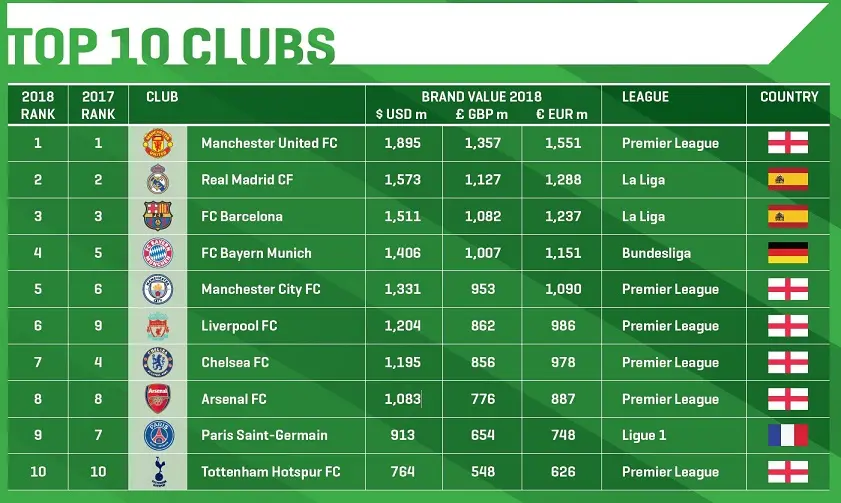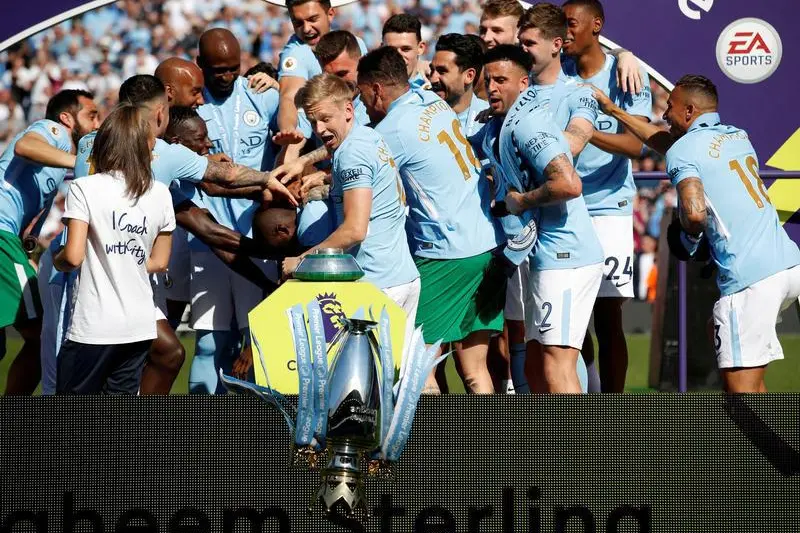PHOTO
Manchester City's improved performance on the field under manager Pep Guardiola has led to an increase in the value of its brand off it, according to a new report by Brand Finance.
The club, which is majority-owned by Abu Dhabi United Group, saw the value of its brand increase by over $300 million, or 30 percent, over the past 12 months to $1.33 billion, according to Brand Finance - moving it up one place to fifth in the ranking of the world's most valuable football brands. The club's historic city rivals, Manchester United, remains the football world's most valuable brand, valued at $1.9 billion - ahead of Spanish giants Real Madrid ($1.57 billion) and FC Barcelona ($1.51 billion) Germany's FC Bayern Munich is the fourth-most popular brand, at $1.33 billion.
Brand Finance director Bryn Anderson said that the increase in value in Manchester City's brand was the result of a number of factors.
"Manchester City has improved both in terms of revenues and in terms of the strength of the brand," Anderson said in an emailed response to questions from Zawya.
Manchester City’s revenue and forecast revenue is improving due to increase in broadcasting and prize money receipts following its recent English Premier League win and an improved performance in the European Champions' League tournament. The club is also likely to generate more money from its kit deal as its current agreement with Nike expires next year, and it is planning a further expansion in stadium capacity by 2021 to 61,000, which would make it the second-biggest club ground in England (behind Manchester United).


Its current capacity of 55,000 was achieved through a 2015 stadium expansion to 61,000.
Global fanbase growing
Anderson said the club's brand rating had also improved as a result of "bespoke research in India, USA and China", which indicated a relatively strong affinity for Manchester City in the three markets given the club's recent success.
City Football Group, the Abu Dhabi-owned entity which is developing a global network of clubs that includes New York City FC and Melbourne City FC, sold a 13 percent stake to Chinese investors including CITIC Group and China Media Capital for $400 million.
Meanwhile, Paris St Germain (PSG), the French club owned by Qatar Sports Investments, dropped two places in Brand Finance's rankings to ninth, as its brand value declined by 10 percent to $913 million.
Anderson said the fall in value of the club's brand was "largely attributable to underperformance in the Champions League and a lag behind other large clubs in terms of ability to generate commercial revenue".


Meanwhile, Anderson said that if Egypt's Mohamed Salah manages to fire Liverpool to a win in the European Champions' League final against Real Madrid on May 26, his club’s brand value could increase by $85 million. Liverpool is already the sixth-most valuable football brand with a value of $1.2 billion.
In terms of sponsorship, Brand Finance said that Dubai-based airline group Emirates enjoyed the highest level of brand awareness (32 percent) of any football shirt sponsor. The airline invests heavily in shirt sponsorships of several top European clubs - spending $85 million a year to sponsor Real Madrid, $42 million to sponsor Arsenal FC and $32 million to sponsor Paris St Germain. It also sponsors Italian giants AC Milan. Chevrolet is a close second with a 30 percent recognition, despite having only one major sponsorship deal with Manchester United.
Anderson said that Emirates, which yesterday announced that its 2017 annual profit more than doubled to 2.8 billion UAE dirhams ($762 million) on sales of over 100 billion dirhams, gains both quantitative and qualitative benefits from its sponsorship of major European football clubs.
"Football is truly a global sport and allows Emirates to reach multiple customers and potential customers around the world, aligning to their vision of being a global airline," he said.
Our Standards: The Thomson Reuters Trust Principles
Disclaimer: This article is provided for informational purposes only. The content does not provide tax, legal or investment advice or opinion regarding the suitability, value or profitability of any particular security, portfolio or investment strategy. Read our full disclaimer policy here.
(Reporting by Michael Fahy; Editing by Shane McGinley)
(michael.fahy@thomsonreuters.com)
Our Standards: The Thomson Reuters Trust Principles
Disclaimer: This article is provided for informational purposes only. The content does not provide tax, legal or investment advice or opinion regarding the suitability, value or profitability of any particular security, portfolio or investment strategy. Read our full disclaimer policy here.
© ZAWYA 2018





















